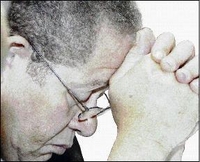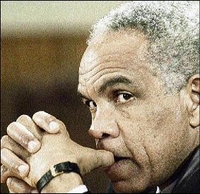
Ian Boyne
There can be no triumphalism this afternoon when Bruce Golding takes his stand in the National Arena. There might be a sea of people before him, but uppermost in his mind must be the capital letter 'C' for crisis.
The economic crisis (local and global), the Dudus crisis, the crime crisis, the health crisis, the corruption crisis, the impending public sector crisis and the International Monetary Fund (crises), the social crisis (symptomised by the Gully-Gaza conflict), and the crisis of confidence.
Swept to power just two years ago by an unstoppable wave of enthusiasm and optimism, 'Mr Fix It' today addresses Labourites and the nation after Britain's leading magazine, The Economist, suggests that he finds Jamaica's problems "unfixable", and after two downgrades by influential rating agencies.
Golding's ability to talk a good talk has never been in doubt, even if he is not accused of being charismatic. But today he has to come good to convince the Jamaican populace that the confidence reposed in him in September 2007 is well placed after all these crises. Golding is likely to insist these crises were not of his making; that he merely inherited them and, therefore, we must be patient with him as he has been dealt an awful hand. Others will say he must play the hand he has been dealt, rather than cry in his soup and engage in a game of what-might-have-been.
sad reflection
Now, this is why we need a debate between Golding and the People's National Party (PNP). I had called for it a couple of months ago in a column but last weekend Golding himself challenged the PNP to a debate on the economy. Regrettably, The Gleaner on Wednesday poured cold water on the call in an editorial titled 'Forget the debate, get on with the job', as though the two were incompatible.
It is surprising that a media house - indeed, the country's oldest and most reputable - should take this curious stand. If the media can't see the value of debate and intellectual exchange in a democratic society - and regard that as a waste of time - then that is a sad reflection on our society.
Says the Gleaner editorial: "Such a debate, therefore, would at best be an energy-sapping distraction from the real problems facing Jamaica and the obligation of the Government to get about fixing them." Now, I would agree with the editorial writer if the debate were to be solely about the PNP's 18 years in office. The debate must also be about Jamaica's performance since the JLP came to power two years ago and the way forward.
The Gleaner also on the same day published two letters titled 'No time for debates' and 'National debate - time wasting'. They were as misguided as the editorial. Regrettable, too, is that the youth arm of the PNP issued a release on Wednesday saying no to a debate. "The request for a debate is nothing more than yet another distraction and sideshow."
You would have expected young people to prod their elders to debate, to engage political opponents, to relish the democratic ideal of cross-questioning, a time-honoured method of getting at truth and exposing sloppy thinking and unwarranted assumptions.
Instead the PNPYO, for apparently purely partisan reasons which are not hard to figure out, rushes to protect. The PNP should be salivating at the opportunity to debate the Jamaica Labour Party about its record. Under increased pressure, the JLP seems more willing these days to go back to the past and, more particularly, to target former finance minister Omar Davies for special attention and critique. Omar should be delighted at the opportunity to clear his name.
I had called for a debate between Golding and Omar not because of any disrespect for PNP president Portia Simpson Miller, for whom I have the utmost regard and personal affection. I called for the debate between these two gentlemen because Omar has been carrying the finance portfolio for the PNP for many years and because the PM has been the point man defending the Government's economic polices and its decision to re-engage the IMF. He has been doing the town-hall meetings.
My point was that rather than just holding town-hall meetings where Government presents its positions, the prime minister should either face the Opposition in a public forum or through mass media in debate with the man who has been the face of the PNP's policies over the many years. (I didn't mean to disrespect either Portia or Audley). And I think we need to get past this matter of who will do the debate, for my guess is that this is the main reason for the reluctance on the part of the PNP to have this debate. There is nothing that says the debate has to be between the two leaders if the economy is the main focus.
different ideas
When issues of the PNP's management of the economy over the last number of years comes up, it is Omar Davies' name which is mentioned, and it is only fair that he should stand in his own defence. So it is no embarrassment for the PNP to put him up as its main debater. There should be no disrespectful and cynical talk from Labourites about which leader is the better debater, etc. Forget that nonsense. We are taking about two parties with different ideas (they say) of how the economy should be run. It does not matter whom they put up to debate. What matters is that the party position is represented.
My view is that the debate should take place after the IMF agreement is signed and the prime minister makes his national broadcast. The PNP can be expected to come out and say what a disastrous IMF agreement it is and how it will savage the poor. They will rip into Golding and the JLP and show what an abysmal failure they have been and how they have betrayed their election promises. As a Jamaican, I want to see the PNP defend its alternatives and tell Golding to his face why his strategies for economic growth will take us deeper in the hole.
I want to hear how Golding defend himself and his government. This nonsense about debates distracting us from tackling the real problems ignores the fact that debates are taking place all the time between the parties; it's just that they are not facing each other. The prime minister is holding town-hall and other meetings giving his government's perspectives on the economic crisis, and the PNP is putting on various fora, commendably, addressing issues of national concern, as well as literally issuing releases every day.
Why does the PNP not want to face Golding and stand the scrutiny of speaking up for its record in government? Is the PNP ashamed of its record? Does it regard its 18 years in government as indefensible and something to be ashamed of? Use the golden opportunity that the prime minister has presented to debate him outside of Parliament. Let the Media Association Jamaica or the Press Association of Jamaica arrange a full two-hour debate, with much interaction and cross-talk so we can hear the issues thrashed out.
Let's get past the idle chatter, the uncontested talk, the propaganda.
Debates can be conducted in a civilised, rational, intellectually penetrating and stimulating way. This country must get accustomed to debating ideas, contesting visions and examining alternatives. The media should be the primary group pushing for this debate between Golding and the PNP. As journalists, we must treasure and promote the rational exchange of ideas, rigorous scrutiny of positions and the blooming of a hundred flowers, as it were.
This society has not learnt how to talk things out rather than fight it out. We need to be more practised at debates and we must not succumb to the anti-intellectual seduction of seeing debates as distractions and time-wasting exercises. Too many of us call for action but praxis, as the Marxists call it, without proper reflection and analysis, is a dangerous and reckless venture.
Part of our problem is that we operate on too many unexamined assumptions, hunches and traditions have had too little give-and-take; too little engagement of ideas and testing of our views against out best opponents. It is not either debate or action. It is both.
We have serious issues to debate: Why did the PNP use a high interest rate policy for so long? I don't believe it was because Omar Davies was wicked or a fool. How did we get into this debt crisis and what can be done to get us out? What are the risks of a liquidity management programme, or whatever euphemism we use for debt restructuring? What's the best possible agreement we could get from the IMF? (Incidentally, my view is that 'no deal is better than a bad deal', and I prefer my Government to fight for the best deal than to be rushed to conclude a bad IMF deal).
rigorous debate
My view is that the PNP can defend its record in Government far better than many JLP propagandists believe, and that Bruce Golding can adequately face up to some of the questions Comrades believe he can't answer. It's time we get the political parties together and have them engage in a serious, respectful and rigorous debate. This is no public spectacle, as one Gleaner letter writer opined. "How does a challenge to debate help us in our hour of crisis?" another questioned.
Because there are people offering dangerously simplistic and unworkable ideas which, if left unchallenged, will lead the simple-minded to take wrong actions and to have unrealistic expectations. What you don't want in a crisis is to react emotionally and be swayed by propaganda. Crisis leads people to irrational thinking and gut reaction. A debate can help to show up the bankruptcy of certain positions posing as answers.
Come on, PNP, for democracy's sake, accept Golding's challenge to debate.
Ian Boyne is a veteran journalist who may be reached at ianboyne1@yahoo.com or gleanerjm.com.

Golding

Davies
